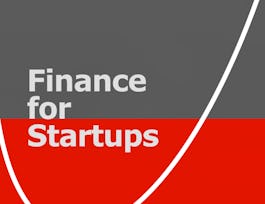This course provides a brief introduction to the fundamentals of finance, emphasizing their application to a wide variety of real-world situations spanning personal finance, corporate decision-making, and financial intermediation. Key concepts and applications include: time value of money, risk-return tradeoff, cost of capital, interest rates, retirement savings, mortgage financing, auto leasing, capital budgeting, asset valuation, discounted cash flow (DCF) analysis, net present value, internal rate of return, hurdle rate, payback period.

Give your career the gift of Coursera Plus with $160 off, billed annually. Save today.


Introduction to Corporate Finance
This course is part of multiple programs.

Instructor: Michael R Roberts
231,524 already enrolled
Included with 
(6,075 reviews)
Skills you'll gain
Details to know

Add to your LinkedIn profile
4 assignments
See how employees at top companies are mastering in-demand skills

Build your subject-matter expertise
- Learn new concepts from industry experts
- Gain a foundational understanding of a subject or tool
- Develop job-relevant skills with hands-on projects
- Earn a shareable career certificate


Earn a career certificate
Add this credential to your LinkedIn profile, resume, or CV
Share it on social media and in your performance review

There are 4 modules in this course
Welcome to Introduction to Corporate Finance! This first module will introduce you to one of the most important foundational concepts in Finance, the time value of money. Before diving into the Video lectures, I encourage you to take a look at the brief pre-reading for the course. Specifically, have a look at “Big Picture Course Motivation,” for additional motivation and context for the course, “Time Value of Money Overview,” for a motivation and context for our first topic, and “Quiz Problem Answer Input.” This last note is particularly important to avoid confusion with the problem sets. Then, go to the Video Lectures and start learning Finance!
What's included
4 videos6 readings1 assignment
In this module, we wrap up the Time Value of Money topic with a discussion of inflation before moving on to our second topic, Interest Rates, and introducing our third topic, Discounted Cash Flow Analysis. By the end of this module, you should feel comfortable with discounting and compounding arbitrary cash flow streams in order to value different claims and make better financial decisions.
What's included
4 videos1 reading1 assignment
This module continues our discussion of discounted cash flow analysis by way of a capital budgeting case. (You might want to download or view the Excel file, “Tablet Case Spreadsheet.xlsx,” that I use in the lectures, but it is not necessary for understanding the material.) By the end of this module, you should feel comfortable valuing claims and making financing decisions in which the timing of the cash flows and compounding of interest is arbitrary (e.g., annual, semi-quarterly, monthly, etc.). Having worked through the problems, you should also be more comfortable with real world financial decision making related to retirement savings, home financing and refinancing, auto leases, and other scenarios.
What's included
3 videos2 readings1 assignment
This module closes out our discussion of discounted cash flow analysis and caps off the course with a discussion of return on investment. By the end of this module, you should feel comfortable with the notion of free cash flow and the ability to apply a set of forecast drivers to project free cash flows into the future. These are some of the elements of a basic financial model, which we will use to come to a decision about the tablet project and to analyze the assumptions behind our valuation.
What's included
3 videos1 reading1 assignment
Instructor

Offered by
Recommended if you're interested in Finance

University of Virginia

Rutgers the State University of New Jersey

University of Illinois Urbana-Champaign

Korea Advanced Institute of Science and Technology(KAIST)
Why people choose Coursera for their career




Learner reviews
Showing 3 of 6075
6,075 reviews
- 5 stars
69.96%
- 4 stars
21.81%
- 3 stars
5.49%
- 2 stars
1.57%
- 1 star
1.15%
New to Finance? Start here.

Open new doors with Coursera Plus
Unlimited access to 7,000+ world-class courses, hands-on projects, and job-ready certificate programs - all included in your subscription
Advance your career with an online degree
Earn a degree from world-class universities - 100% online
Join over 3,400 global companies that choose Coursera for Business
Upskill your employees to excel in the digital economy
Frequently asked questions
Access to lectures and assignments depends on your type of enrollment. If you take a course in audit mode, you will be able to see most course materials for free. To access graded assignments and to earn a Certificate, you will need to purchase the Certificate experience, during or after your audit. If you don't see the audit option:
The course may not offer an audit option. You can try a Free Trial instead, or apply for Financial Aid.
The course may offer 'Full Course, No Certificate' instead. This option lets you see all course materials, submit required assessments, and get a final grade. This also means that you will not be able to purchase a Certificate experience.
When you enroll in the course, you get access to all of the courses in the Specialization, and you earn a certificate when you complete the work. Your electronic Certificate will be added to your Accomplishments page - from there, you can print your Certificate or add it to your LinkedIn profile. If you only want to read and view the course content, you can audit the course for free.
If you subscribed, you get a 7-day free trial during which you can cancel at no penalty. After that, we don’t give refunds, but you can cancel your subscription at any time. See our full refund policy.

